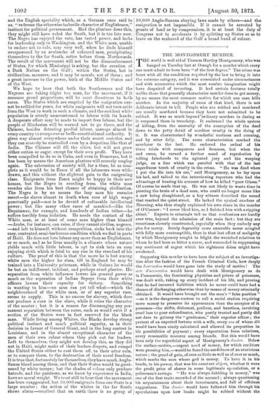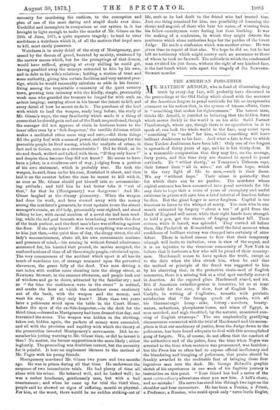THE MONTGOMERY MURDER.
THE world is well rid of Thomas Hartley Montgomery, who was hanged on Tuesday last at Omagh for a murder which every one must admit to have been "of the first degree." The crime was beset with all the conditions required by the law to bring it into the extreme category, and it was committed under circumstances and with accessories which the most sombre imagination might have despaired of inventing. It had certain features totally unlike those that generally characterise murder done to get money, by no means the most common motive for which one man kills another. In the majority of cases of that kind, there is not deliberate intent to kill. People who are robbed and murdered are usually murdered because they have not submitted to be robbed. It was as much beyond 'ordinary murders in daring as it surpassed them in treachery. It embraced the whole system of killing, from the enormity of the conception of the deed down to the petty detail of needless cruelty in the doing of it. It was characterised by wonderful coolness and cunning, and by utter folly. The same characteristics marked the murderer to the last. He endured the ordeal of his three trials with composure and firmness, but when the end came, he earned a further meed of reprobation by telling falsehoods to the agitated jury and the weeping judge, on a line which ran parallel with that of the last superfluous touch of cruelty in the crime. "He was dead when I put the file into his ear," said Montgomery, as he lay upon his bed, and talked to the interviewing reporters who bad the advantage of hearing his account of how he killed "poor Glasse." Of course he made that up. He was not likely to waste time in piercing the brain of a dead man, who could no longer moan like a cow being slaughtered, as a boy witness described the sound that reached the quiet street. He lacked the cynical candour of Manning, who thus simply explained his own share in the murder of O'Connor : "I never liked him, so I finished him with a ripping chisel." Experts in criminals tell us that confessions are hardly ever true, beyond the admission of the main fact ; but they are sometimes cleverly constructed, especially when they embody any plea for mercy. Surely depravity more execrable never mingled with folly more contemptible, than in that last effort of malignity by which Montgomery sought to blight the wretched relatives to whom he had been so bitter a curse, and succeeded in suppressing any sentiment of regret which his righteous &Tom might have awakened.
Supposing this murder to have been the subject of an investiga- tion after the fashion of the French Criminal Code, how deeply the Instruction would have gone into the study of motive ! The acte d'accusatiou would have dealt with Montgomery as de la Pommeraie, the fascinating physician and prince of poisoners, was dealt with, raking up every incident of his life, and proving that he had incurred liabilities which he never could have had a chance of discharging otherwise than by means of money criminally obtained. It would have brought out the man's "false position" —as it is the dangerous custom to call a social station requiring more money to preserve its appearances than the occupier of it possesses—the shifts, dishonest, perilous, and heartless, involving cruel loss to poor subordinates, who partly trusted and partly did not dare to gainsay the "gentleman," their superior officer ; the pretext of an expected fortune with a wife, every sou of whose dot would have been nicely calculated and allowed its proportion in his possibilities of payment ; every expectation from relations, every reasonable resource among friends. But this would have been only the superficial aspect of Montgomery's dossier. Below the surface-motive,—urgent need of money, for which creditors were pressing him,—would be found the sordidness of an avaricious nature ; the greed of gain, of ever so little as well as of ever so much, which marks the man whose god is money. To have it in his hands, in his power, that was his constant object, whether it were the profit price of shares in some legitimate speculation, or a policeman's savings. "He was always dabbling in money," was one of the first traits recorded of the accused ; always questioning his acquaintances about their investments, and full of officious suggestions. The dossier would have followed him through his speculations upon how banks might be robbed without the
necessity for murdering the cashiers, to the conception and plan of one of the most daring and stupid deeds ever done. Unskilful and incomplete in comparison as our system is, it has brought to light enough to make the murder of Mr. Glasse on the 29th of June, 1871, a quite separate tragedy ; to lend to utter sordidness a weirdness which it, of all the motives that impel men to kill, most rarely possesses.
Weirdness is in every detail of the story of Montgomery, pos- sessed by the demon of greed, haunted by anxiety, straitened by the narrow means which, but for the promptings of that demon, would have sufficed, grasping at every shilling he could get, having gambled away the moneys entrusted to him by his own, and in debt to his wife's relatives ; holding a station of trust and some authority, giving him certain facilities and very natural pres- tige, which he would reasonably calculate as odds in his favour ; living among the respectable community of the quiet country town, growing into intimacy with the kindly, simple, presumably weak man who guarded the treasure he longed for with such an ardent longing; carrying about in his breast the intent to kill, and every detail of how he meant to do it. The purchase of the lead with which to load the weapon, ready long before, the study of Mr. Gla.sse's ways, the easy familiarity which made it a thing of course that he should go in and out of the Bank unquestioned, though the manager did not approve of visits in business hours to the inner office even by a Sub-Inspector,' the terrible delusion which makes a meditated crime seem easy and sure,--did these things fill the guilty fool with a sense of power, and that contempt for the peaceable people he lived among, which the analysts of crime, in fact and in fiction, note as a characteristic ? Did be think, as he ate and drank, walked and talked with them, "If they only knew?" and despise them because they did not know ? Ile seems to have been a joker, in a cumbrous sort of way, judging from a portion of his own statement, which is probably true. He took the weapon, he said, from under his coat, flourished it about, and then laid it on the counter before the man he meant to kill with it, as soon as Mr. Glasse should put himself into an accommodat- ing attitude ; and told him he had better take it "out of that," for that he (Montgomery) was dangerous ! And Mr. Glasse laughed at the clumsy pleasantry. When the weapon had done its work, and been stowed away with the money among the murderer's garments, he went upstairs to see the absent manager's cousin, an old lady, presumably near-sighted, and stood talking to her, with casual mention of a novel she had been read- ing, while the red pool beneath was broadening towards the door of the bank parlour, and the dead man's face was stiffening against the floor. If she only knew? How well everything was standing to him just then,—the quiet time of day, the sleepy street, the old lady's unconsciousness, above all, his own consummate coolness and presence of mind,—his coming in without formal admittance accounted for, his hurried visit proved, its motive accepted, the confused notions of time of all these simple people, calculated upon. The very commonness of the accident which upset it all has its touch of weirdness too, of strange comment upon the perverted cleverness, the grave folly of the deed. Two men driving a cart laden with cockles come shouting into the sleepy street, at Newtown Stewart, in the summer afternoon, and people look out of windows and go to doors, attracted by the familiar cry ; and so "the time the cocklemen were in the street" is noticed, and marks the hour at which the murderer came cautiously out of the bank, with the weapon and the money, and went his way. If they only knew ? More than two years later a policeman stood upon the table in the Court House, before the eyes of the ex-Sub-Inspector,—in the dock for the third time,—dressed as Montgomery had been dressed that day, and travestied the scene. The weapon was hidden in the clothing, taken out, hidden again, the packets of money were concealed, and all with the precision and rapidity with which the theory of the prosecution invested Montgomery's movements. Did he re- member his jesting warning to Mr. Glasse then, or did he invent it then? No matter, the former supposition is the more likely ; either is ghastly. The proceeding was doubtless correct, but the necessity for it painful. It bore an unpleasant likeness to the method of Mr. Fagin with his young friends.
Montgomery murdered Mr. Glasse two years and two months ago. He was in prison during all that time. He underwent the suspense of two inconclusive trials. He had plenty of time all alone with his crime. He behaved well, and he looked well ; he was a rather handsome, gentlemanly man, but with a bad countenance ; and when he came up for trial the third time, people said he showed no signs of suffering, mental or physical. For him, at the worst, there would be no sudden striking-out of ' life, such as he had dealt to the friend who had trusted him. Just one thing remained for him, one possibility of lessening the shame and anguish of those who bear his name, of winning from his fellow-countrymen some feeling less than loathing. It was the making of a confession, in which they might discern the penitence which alone authorises hope for the pardon of the Great Judge. He made a confession which was another crime. He was given time to repent of that also. We hope he did so, but he has left no testimony which might convey such an assurance to those of whom lie took no farewell. The solitude in which the condemned man awaited his just doom, without the eight of any kindred face, is the last touch which sets apart the tragedy of the Newtown- Stewart murder.































 Previous page
Previous page